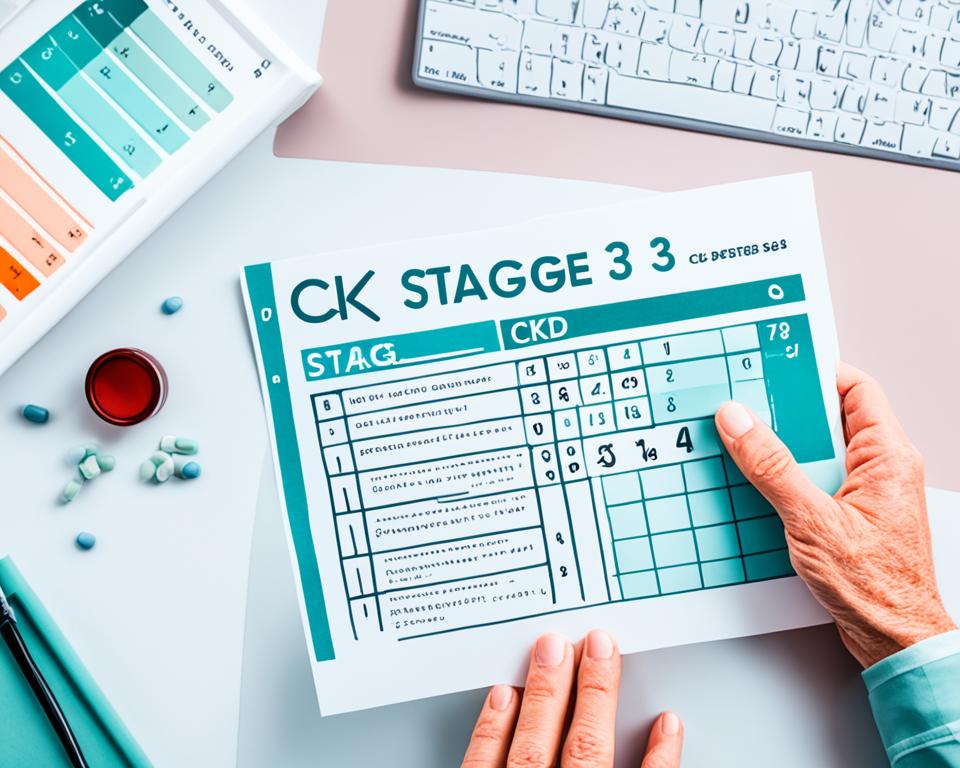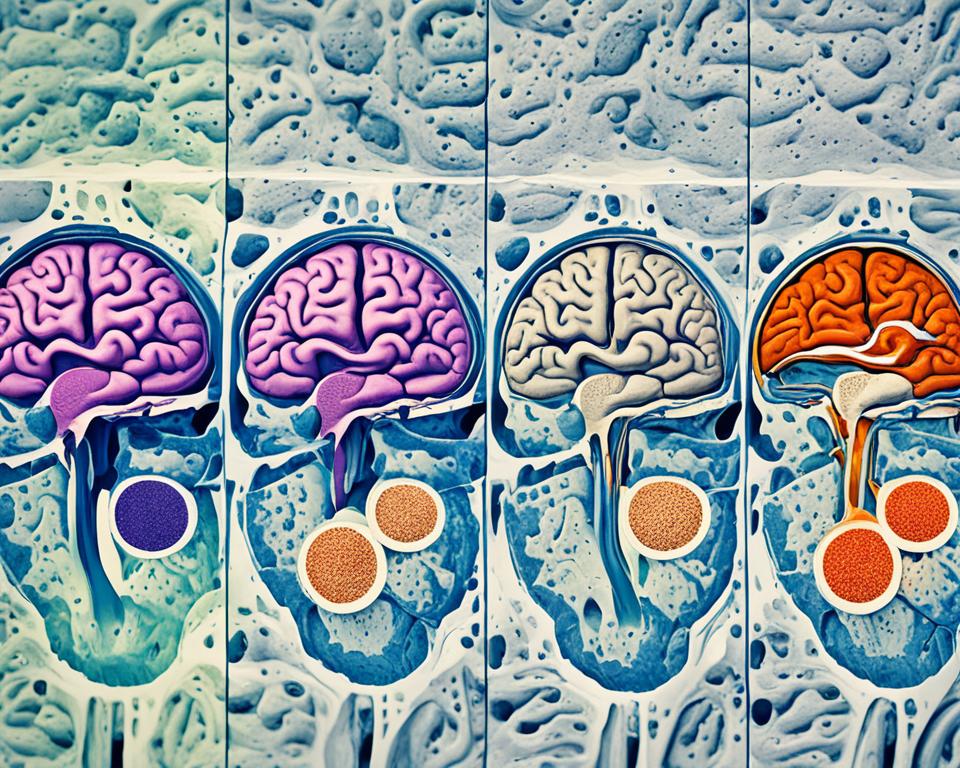Chronic kidney disease (CKD) worsens over time and affects health and life span. Knowing what to expect in each stage is key to dealing with it well. This piece looks at what to expect in CKD stage 3, a key point in its development.
Read interesting things at : climbing-gym-oz
Key Takeaways
- CKD stage 3 shows a moderate loss in kidney function. Glomerular filtration rate (GFR) falls between 30-59 mL/min/1.73m².
- Life expectancy in CKD stage 3 varies. It depends on age, other health issues, and how fast the disease gets worse.
- Being proactive by changing your diet, lifestyle, and sticking to medication can slow the damage and make you live longer.
- It’s vital to keep a close eye on your health and work closely with your doctors to manage CKD stage 3 and avoid problems.
- Knowing the risk of CKD moving to end-stage renal disease and the treatments available, like dialysis or a kidney transplant, helps prepare you for the future.
Understanding CKD Stage 3
Chronic kidney disease (CKD) is a slow-progressing health problem. It affects how well our kidneys work. There are different stages of CKD, known by the rate at which the kidneys clean our blood. Stage 3 CKD means there’s a moderate drop in kidney function.
Defining Chronic Kidney Disease
Chronic kidney disease is a serious health issue over time. It makes the kidneys less able to get rid of waste and extra water from the blood. Without proper filtering, bad substances can build up, causing health troubles if not handled.
Symptoms and Diagnosis
In the early stages, you might not feel CKD. This makes finding it tough. As kidney function worsens, some signs may show, like being tired a lot or needing to pee often, especially at night.
- Fatigue and weakness
- Frequent urination, especially at night
- Swelling in the legs, feet, or ankles
- Decreased appetite and nausea
- Difficulty concentrating or memory problems
Doctors use tests to spot CKD. They check your blood and urine. This helps see how well your kidneys are working and if they’re damaged.
| CKD Stage | GFR (mL/min/1.73m²) | Kidney Function |
|---|---|---|
| Stage 1 | ≥90 | Normal or high |
| Stage 2 | 60-89 | Mildly decreased |
| Stage 3 | 30-59 | Moderately decreased |
| Stage 4 | 15-29 | Severely decreased |
| Stage 5 | Kidney failure (End-stage renal disease) |
Knowing about CKD’s stages and symptoms is key. It helps find and manage the disease early.
Factors Affecting Life Expectancy
When someone has CKD stage 3, many things can influence how long they will live. It’s important to know these factors to better handle the disease. This knowledge helps in choosing the right treatment and lifestyle changes.
Glomerular Filtration Rate (GFR)
GFR tells us how well the kidneys are working. It’s key in predicting outcomes for those with CKD stage 3. As GFR drops, so does kidney health, increasing the chances of complications.
Regular checks on GFR help doctors see the disease’s progress. This allows them to slow down the loss of kidney function.
Comorbidities and Complications
Many people with CKD stage 3 also have other health issues. These include diabetes, high blood pressure, heart disease, and anemia. The seriousness of these conditions affects the overall outlook and increases the risk of complications.
Working closely with healthcare professionals to manage these conditions is crucial. This minimizes their effects on life length and quality. Through regular checks, proper treatment, and lifestyle changes, those with CKD stage 3 can improve their health outcomes and delay disease progression.
“Early detection and management of comorbidities are crucial in preserving kidney function and extending life expectancy for individuals with CKD stage 3.”
CKD Stage 3 Life Expectancy
Chronic kidney disease (CKD) stage 3 affects people differently. It means there’s a moderate drop in kidney functioning. Knowing the usual outcome is key for both patients and their doctors.
The average life span for those with CKD stage 3 is about 24 years for men and 27 years for women. But keep in mind, these are rough estimates. Actual life span depends on many things. This includes what caused the kidney disease, other existing health problems, and general health.
| Characteristic | Average Life Expectancy |
|---|---|
| CKD Stage 3 (Men) | 24 years |
| CKD Stage 3 (Women) | 27 years |
Remember, these numbers are just averages. Many things can make a big difference to how long a person might live. The cause of the kidney disease, other health issues (like diabetes or heart disease), and general health status all play a part.
What you do daily and how you manage your health matters a lot. Getting regular check-ups, following the doctor’s advice, and managing other health problems are important. This can help you live longer with CKD stage 3. Working closely with your healthcare team is vital for better life quality.
“Detecting CKD early and managing it well can greatly change the life span and outlook for those affected.”
If you have CKD stage 3, taking an active role in your health is crucial. Work with your healthcare providers to develop a plan that covers all your needs. Understanding how to improve your health and slow kidney disease is key.
Progression to End-Stage Renal Disease
Chronic kidney disease (CKD) slowly gets worse. For those at stage 3, the risk of reaching end-stage renal disease (ESRD) is high. ESRD is when the kidneys work at less than 15%. This makes ckd stage 3 to end-stage renal disease a big worry. It may lead to needing life-saving treatments like dialysis or kidney transplantation.
The speed at which kidney disease progresses varies. Many things can impact this, such as:
- The root cause of CKD (like diabetes or high blood pressure)
- How bad the kidney damage is, shown by the GFR results
- Other health problems, like heart disease or anemia
- Choices like eating poorly, not being active, and smoking
- How well treatments and management work
If you’re at stage 3, it’s crucial to team up with your health experts. They’ll help keep an eye on your condition and set up ways to slow down the kidney disease progression. This might mean changing how you eat, taking medicines, and checking your kidney health regularly.
“Finding CKD stage 3 early and managing it well can make a big difference. It can slow down the move to end-stage renal disease. This means better lives for patients.”
Awareness of the risks and active management can help those at stage 3 avoid or delay the need for dialysis or kidney transplantation. Keeping in touch with your healthcare gurus and sticking to your treatment plans is crucial.
Diet and Lifestyle Modifications
Dealing with CKD stage 3 requires more than just medicine. Making changes in what you eat and how you live is key. This can slow down the disease and boost your health. Let’s walk through the important diet and lifestyle tips for CKD stage 3.
Dietary Recommendations
A diet for CKD stage 3 focuses on nutrients that are rough on the kidneys. Here’s what you should aim to do:
- Limit protein to 0.6-0.8 grams per kilogram of your weight daily. This eases the work on your kidneys.
- Cut down on sodium to less than 2,300 milligrams per day. It helps with blood pressure and fluid control.
- Watch your phosphorus intake. Avoid or limit foods high in phosphorus like dairy, nuts, and whole grains.
- Eat more fruits and veggies, which have potassium. But, avoid those very high in potassium if your levels are too much.
- Drink a lot of water and cut back on sugary or caffeinated drinks.
Exercise and Weight Management
Keeping active and staying at a healthy weight are crucial if you have CKD stage 3. Exercise does wonders for your heart, blood pressure, and muscles. For CKD stage 3, these exercises are recommended:
- Low-impact activities like walking, swimming, or cycling.
- Strength exercises to keep your muscles strong.
- Flexibility and balance workouts to boost your physical abilities.
Maintaining a healthy weight also reduces stress on your kidneys. A dietitian or doctor can help create a plan just for you.
By choosing a diet that’s good for your kidneys and staying active, you can really help yourself. Your health and happiness will thank you.
Medication Management
Dealing with chronic kidney disease (CKD) stage 3 means a lot of medicines. These meds slow down the disease, control symptoms, and prevent problems. Knowing what meds you take, why you take them, and what could go wrong is vital for CKD stage 3 patients.
Medications for CKD Stage 3
For CKD stage 3, you might get different kinds of medicines, such as:
- Angiotensin-converting enzyme (ACE) inhibitors or angiotensin II receptor blockers (ARBs) to manage blood pressure and keep the kidneys safe
- Diuretics to help with fluid and ease the kidneys’ load
- Phosphate binders to keep phosphorus in check
- Calcium supplements or vitamin D for strong bones
- Erythropoietin-stimulating agents (ESAs) to handle anemia, which is common with CKD
- If you have diabetes, you’ll get meds to manage it
Following your medication plan closely is very important. It can slow down the disease and delay the move to severe kidney problems.
Potential Side Effects
Yet, meds for CKD stage 3 can bring about some unwanted effects. Keep an eye out for these common side effects:
- If you take ACE inhibitors or ARBs, a dry cough or dizziness might show up
- With diuretics, you could pee more or have an imbalance in some minerals
- Phosphate binders might lead to stomach issues
- ESAs could cause headaches or make your skin reddish and warm
Tell your doctor about any side effects. They might need to change your meds to keep your plan working well and protect your health.

Managing your medicines well is key in caring for CKD stage 3. Team up with your healthcare team to make a plan right for you. This way, you get the most out of your meds with fewer side effects.
Monitoring and Follow-Up
Checking on your health regularly is key for those with CKD stage 3. This lets healthcare pros make smart choices for treatment and care. Better management means better health outcomes. We will look into the tests used to watch CKD stage 3 and how the healthcare team helps with care.
Kidney Function Tests
Tests to see how well your kidneys work are vital for CKD stage 3. Blood tests check your glomerular filtration rate (GFR) to see how your kidneys filter waste. Urine tests are also done to find kidney damage signs. You usually take these tests every 3 to 6 months to watch how your kidneys are doing.
Regular Doctor Appointments
People with CKD stage 3 need to see their doctors often. During these talks, doctors look at kidney test results and hear about any new problems. Then, they might change the treatment plan. It’s really important for you to share how you feel and any health changes.
Collaborative Healthcare Team
Dealing with CKD stage 3 often needs a team effort. This group might have kidney experts, family doctors, nurses, dietitians, and more. They all work together to care for you. Good teamwork between them guarantees you get the best care.
“Proactive monitoring and follow-up are essential for individuals with CKD stage 3 to preserve kidney function and delay the progression of the disease.”
Getting involved in your care helps you and your healthcare team manage CKD stage 3. This keeps you healthy and feeling well.
Renal Replacement Therapy
If you have chronic kidney disease (CKD) stage 3, you might reach a point where your kidneys can’t work well enough. This stage is known as end-stage renal disease (ESRD). You’ll need renal replacement therapy. This helps keep you healthy and maintain your quality of life. We’ll look at the different dialysis choices and the option for kidney transplantation. It’s a long-term fix for many people.
Dialysis Options
When someone with CKD stage 3 gets to ESRD, dialysis is crucial. Dialysis has two main kinds: hemodialysis and peritoneal dialysis. Hemodialysis cleans your blood with a machine. Peritoneal dialysis uses your own peritoneal membrane to filter out waste and extra fluids.
- Hemodialysis is often at a hospital or clinic, filtering the patient’s blood through a machine a few times weekly.
- Peritoneal dialysis is done at home, filtering waste and fluids with the peritoneal membrane. You can do this by hand or with a machine.
The choice between hemodialysis and peritoneal dialysis varies. It depends on your health, life, and preference. Your healthcare team will help pick what’s best for you.
Kidney Transplantation
Some CKD stage 3 patients with ESRD can benefit from a kidney transplant. A successful transplant can make your kidneys work normally. This means no more dialysis. Deciding if a transplant is right for you involves your overall health and having a good donor match.
“Kidney transplantation can greatly improve survival and quality of life for those with ESRD.”
You might get a kidney from someone living or from a deceased person. The transplant involves detailed checks, working with a transplant center, and ongoing care for your new kidney.
Learning about the different therapies helps you and your healthcare team make the best choices as your kidney disease progresses. This understanding is key in making choices for your care and future.
Impact on Quality of Life
Chronic kidney disease (CKD) stage 3 seriously affects how people live. It brings both physical and mental struggles, affecting one’s emotional health and how they interact with others.
Many things influence the ckd stage 3 quality of life. These include disease progression, other health issues, and how well someone can look after their health. Fatigue, less ability to move, and issues with everyday tasks affect independence and well-being.
CKD stage 3 also hits mental health and emotional well-being. The stress of dealing with a long-term condition and its costs can lead to anxiety and sadness. This also makes it hard to find meaning in life.
“Living with CKD stage 3 can be a rollercoaster of emotions. One day, I feel like I have it all under control, and the next, I’m overwhelmed by the challenges of managing my condition and its impact on my daily life.” – Sarah, 58, living with CKD stage 3
Social support is key for those battling CKD stage 3. Due to health limits, staying social and working a regular job can be tough. Family, friends, and healthcare teams play a big part in helping with day-to-day and emotional struggles.
- It’s vital to meet both the physical and emotional needs of CKD stage 3 patients for a better life quality.
- Support strategies like exercise, a healthy diet, and stress relief can lessen the disease’s impact on emotion and physical health.
- Getting help from doctors, mental health experts, and a strong support system is important for managing CKD stage 3.
Taking a broad approach to handling CKD stage 3 helps improve life quality. Care teams and loved ones can support those with CKD to lead full lives despite the disease.
Palliative Care Considerations
For those with chronic kidney disease (CKD) stage 3 nearing the end stage, palliative care is key. It focuses on easing symptoms, enhancing life quality, and helping both patients and their families. This is a tough period, and support is crucial.
One vital part of palliative care is advance care planning. This means talking with doctors, family, and friends about what the patient wants near the end. It helps ensure the patient’s last wishes and choices are followed, and their goals are met.
Symptom management is also critical. CKD stage 3 patients might face discomfort like fatigue, nausea, or pain. A personalized treatment plan with a palliative care team can make symptoms better, boosting the patient’s well-being.
Hospice care caters to those in CKD stage 3’s final stages. It offers medical, emotional, and practical help for both patients and their families. Through hospice, patients can stay home, close to their loved ones, while they get the care they need.
Integrating palliative care concepts greatly benefits CKD stage 3 patients and their families’ lives. Focus on managing symptoms, advance care planning, and supportive care ensures personalized and compassionate treatment for these individuals in need.
“Palliative care is for those with serious illness, not just those who are dying. It helps everyone live as fully as possible.”
Emotional and Mental Health Support
Dealing with stage 3 chronic kidney disease (CKD) can be tough emotionally and mentally. People face a lot of changes and challenges. It’s very important to focus on dealing with the feelings and thoughts tied to CKD for a better life.
Talk therapy can really help those with CKD stage 3. Mental health experts trained in guiding people with stress, anxiety, and depression offer support. Either in personal talks or group settings, they teach valuable skills to improve mental well-being.
Being in a support group can also aid anyone experiencing CKD stage 3. This may include finding others with similar situations. It helps to connect, share experiences, and learn from each other. These communities can help folks feel stronger and more hopeful as they face CKD together.
The mental health help available can differ by where you live and your healthcare system. If someone needs emotional support, they should ask their doctor. There may be things like online communities or virtual services they can try.
Helping with the mental and emotional parts of CKD matters a lot. It makes everything easier to handle for those with the disease. They can stay positive about their health and the future with these steps.
| Resource | Description |
|---|---|
| National Kidney Foundation | Provides a range of support services, including counseling and support groups, for individuals with chronic kidney disease. |
| American Association of Kidney Patients | Offers peer-to-peer support, online communities, and educational resources to help patients and their families navigate the emotional aspects of CKD. |
| Mental Health America | A national organization that provides information, resources, and support for individuals dealing with mental health challenges, including those related to chronic health conditions. |
“Taking care of your mental health is just as important as managing your physical health when living with chronic kidney disease. Seeking emotional support can make a significant difference in your overall well-being.”
Supporting the emotional and mental well-being of people with CKD stage 3 is key. Access to the right support can empower them to go through this with strength and hope.
Preparing for End-Stage Renal Disease
Individuals with chronic kidney disease (CKD) must start planning when they reach stage 3. This is crucial for handling end-stage renal disease (ESRD) smoothly. They need to prepare for options like dialysis or a kidney transplant.
Dialysis planning is a vital part of getting ready for ESRD. Patients should learn about their dialysis options, such as hemodialysis and peritoneal dialysis. Understanding the advantages and disadvantages is key. It helps them choose the best option when the time comes.
Besides dialysis, it’s wise for stage 3 CKD patients to think about getting on the kidney transplant waitlist. Signing up early is a good move since it can take years. The healthcare team will help with the steps and tell about transplant eligibility.
Planning for ESRD also means looking into advanced care planning. It’s about talking and writing down your medical care wishes, what you want at the end of life, and choosing someone to make health decisions for you. These talks help ensure your choices are honored if you can’t speak for yourself later on.
| Dialysis Planning | Kidney Transplant Waitlist | Advanced Care Planning |
|---|---|---|
| Understand different dialysis modalities | Start the evaluation and registration process early | Document preferences for medical care and end-of-life wishes |
| Work with healthcare team to choose the best option | Meet eligibility criteria for kidney transplantation | Designate a healthcare proxy |
Taking steps early to prepare for ESRD offers better control over your healthcare journey. It makes transitioning to necessary treatments easier.

“Early preparation and planning can drastically improve life quality for those with end-stage renal disease.”
Research and Clinical Trials
The medical world is always learning more about chronic kidney disease (CKD). This includes CKD stage 3. Researchers look for new treatments and therapies to help those with CKD stage 3. They do this through ckd stage 3 research and clinical trials.
In the world of ckd stage 3 research, one big focus is on new drug options. These drugs target the specific ways CKD develops and affects the body. Through clinical trials, scientists test these drugs to see if they offer safer, more effective treatments.
Besides new drugs, scientists are checking how lifestyle changes help with CKD stage 3. Clinical trials see if diets, exercise, and other treatments can slow kidney damage. The hope is to improve life for CKD stage 3 patients.
| Ongoing CKD Stage 3 Research Areas | Potential Benefits |
|---|---|
| Novel drug therapies | Improved treatment options, slower disease progression |
| Lifestyle and dietary interventions | Enhanced quality of life, preserved kidney function |
| Regenerative medicine and cell-based therapies | Possibility of kidney function restoration, reduced need for dialysis or transplantation |
People with CKD stage 3 can join clinical trials to get these new treatments. It gives them a chance for cutting-edge care. Working with their healthcare team, they can learn about these research options.
“The progress we’ve made in ckd stage 3 research is truly exciting, and I’m hopeful that the insights we gain from these clinical trials will lead to better outcomes for patients living with chronic kidney disease.”
– Dr. Emily Watkins, nephrologist and principal investigator of a CKD stage 3 clinical trial
Research and clinical trials give hope to those with CKD stage 3. They pave a path to better life quality and might slow down the disease. This journey of finding new treatments continues, bringing hope along.
Conclusion
In this guide, we dove into CKD stage 3 life expectancy. We looked at what can change your chances and how to manage kidney disease. It’s important to know how your GFR, other health issues, and early treatment matter. These factors help those with CKD stage 3 work with their doctor for better health and life quality.
Handling kidney disease well means doing many things. You might need to change what you eat, how you live, your meds, and check closely. Doing all of this helps slow down the disease, avoid problems, and feel better overall. With smart self-care and expert advice, you can lead your health the best way.
As you face CKD stage 3, keep hope and strength close. Stay educated, follow your care plan, and keep happy thoughts. This helps deal with the tough times and aim for a better ckd stage 3 life expectancy by managing kidney disease well. Your healthcare team will be by your side, helping you steer your health for a sunny tomorrow.



